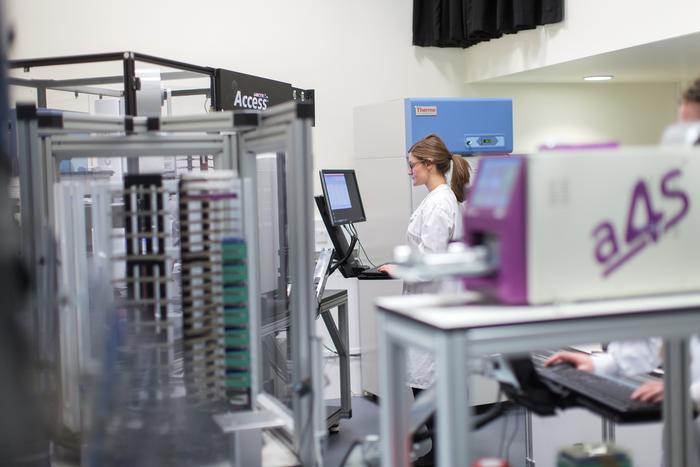Bezos Earth Fund grant establishes new Centre at Imperial to transform global food systems from environmentally damaging to innovative by creating sustainable solutions.

Credit: Thomas Angus / Imperial College London
Bezos Earth Fund grant establishes new Centre at Imperial to transform global food systems from environmentally damaging to innovative by creating sustainable solutions.
Imperial’s Bezos Centre for Sustainable Protein, launched today, will develop innovative and evidence-based solutions through the design, delivery, and commercialisation of alternative food products that are economically and environmentally friendly, nutritious, affordable, and tasty.
The Centre, spanning across seven Imperial academic departments, will advance research into precision fermentation, cultivated meat, bioprocessing and automation, nutrition, and AI and machine learning.
The Bezos Earth Fund is providing the funding as part of a $100 million commitment to developing sustainable protein alternatives and expanding consumer choice and an overall $1 billion commitment to food transformation. It’s one of multiple Earth Fund Centres working with other institutions and industry partners to develop and commercialise new alternative protein products to give consumers more choice for meat and dairy products.
Professor Hugh Brady, President of Imperial College London, said: “Food security is one of the biggest challenges facing humanity. For a sustainable future, we need to ensure that people across the world can be fed adequately and nutritiously with minimal impact on biodiversity, climate and our wider natural environment.
“Imperial has the leading-edge research, innovation, partnerships and convening power to advance global food systems and we are very excited by the potential of our new Bezos Centre for Sustainable Protein.”
Dr Andrew Steer, President and CEO of the Earth Fund said: “The Bezos Earth Fund is proud to support Imperial as the home of our second sustainable protein centre. By 2050 the world population will be over 10 billion, so now is the time to rethink the way we produce and consume food. This work will help ensure that our future includes more protein options – and that they taste great, are nutritious and come at low cost.”
Transforming our food system
Protein is essential to human health; without it our cells, tissues, and organs can’t function. Protein is gained through what we eat, including both animal and plant sources, such as meat, eggs, fish, nuts, and legumes like beans.
However, animal-based protein production requires extensive land use and generates significant greenhouse gas emissions. As the global population expands, the health of both humans and the planet will increasingly depend on widespread availability of proteins that taste good and are produced in ways that reduce emissions and protect nature.
Plant-based proteins are already gaining momentum as meat alternatives, such as in pea-protein-based burgers. In addition, new technologies are making new kinds of protein that also have the potential to fit this bill, including through microbial fermentation, which can produce proteins and nutrients that can be used in food formulations, and cultivated meat grown from animal cells.
Widespread acceptance and uptake of these alternative proteins relies on improvements in their quality and price, as well as reductions in cost and energy use. To transform these proteins into healthy and tasty food, other components also need to be produced more sustainably and efficiently, such as healthy fats and carbohydrates and aspects like flavour, aroma, colourants, and vitamins. This is where engineering biology comes in.
Accelerating development
Engineering biology applies engineering concepts to design, build and manufacture cells and products. The Centre will use a combination of rational and computational-guided engineering strategies with automation at biofoundries – where cells are turned into mini-factories producing useful products – to accelerate the development and scaling up of new bio-based processes.
It will also encompass institutes and facilities that will help translate discoveries into real-world applications, educate the next generation of bioengineers, and support commercialisation. These include the Centre for Synthetic Biology, established in 2009 as the first of its kind in Europe, SynbiCITE, the UK’s industrial translation centre for synthetic biology, and the Centre for Translational Nutrition & Food Research, which has partnerships with Quorn, Nestle, Unilever, and Waitrose, among others.
Director of the new Centre, Dr Rodrigo Ledesma-Amaro, from the Department of Bioengineering at Imperial, said: “The Centre’s ethos is that bio-engineered solutions can – and should – be both planet and people-positive. Imperial is uniquely positioned to harness the potential of engineering biology to accelerate the alt-protein revolution and transform global food systems.”
Dr Andy Jarvis, the Earth Fund’s Director of Future of Food, said: “Later is dangerously too late if we’re to think about growing our world’s protein sources. Imperial College London has led pioneering efforts in the field of Engineering Biology, perfectly positioning the university to advance sustainable protein options that will satisfy the growing global masses.”
International partners
The Centre’s hub will be based at Imperial, with three spokes in the UK and three abroad, with more than 65 international partners spanning cutting-edge research and innovation to commercialisation of new products.
The UK spokes are grouped under members of the Cellular Agriculture Manufacturing Hub at UCL and Aberystwyth University, the Food Centre at Reading University, and the Growing Kent & Medway consortium involving the National Institute of Agricultural Botany and the Universities of Kent and Greenwich.
International spokes are hosted by the Technical University of Denmark (Biosustain), Tufts University (Centre for Cellular Agriculture), and the National University of Singapore.
The launch of the Bezos Centre for Sustainable Protein at Imperial follows the announcement of a sister centre last month at North Carolina State University, as part of the Bezos Earth Fund’s commitment to help transform food and agricultural systems, which also includes efforts to reduce livestock emissions.



